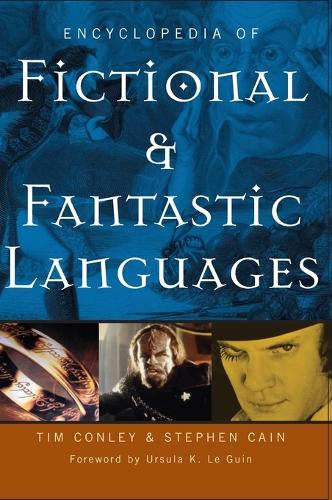
Encyclopedia of Fictional and Fantastic Languages
(Hardback)
Publishing Details
Encyclopedia of Fictional and Fantastic Languages
By (Author) Tim Conley
By (author) Stephen Cain
Bloomsbury Publishing PLC
Greenwood Press
30th June 2006
United States
Classifications
General
Non Fiction
Linguistics
809.3876
Physical Properties
Hardback
272
Width 178mm, Height 254mm
709g
Description
Fictional languages are central to numerous creative works. This book examines such languages in a wide range of literature, films, and television shows. Included are alphabetically arranged entries on particular works. Many of these works are widely taught, such as All's Well That Ends Well, Gulliver's Travels, Nineteen Eighty-Four, and Utopia, while others are popular books, films, and television series, such as Buffy the Vampire Slayer, Cat's Cradle, The Lord of the Rings, and Star Wars. Thus the encyclopedia helps students understand texts central to the curriculum and popular culture. Each entry discusses the role of imaginary languages in a particular work. Entries range from antiquity to the present and close with suggestions for further reading. The encyclopedia ends with a selected bibliography and includes various helpful finding aids. Some of the most popular creative works are appealing because of the artificial worlds their authors create. In many of these works, fictional languages are essential to the setting and plot, and often help the author comment on social issues. This encyclopedia examines fictional and fantastic languages in a broad range of literature, films, and television shows. Each entry discusses the features of the invented language central to the work and relates it to the film, literary text, or television program. Entries provide suggestions for further reading, and the Encyclopedia closes with a selected bibliography. Because many of the works discussed are central to the curriculum, the Encyclopedia will help students understand these texts and the importance of language. At the same time, the volume's coverage of popular books, films, and television series invites students to explore more critically those works that are most likely to interest them.
Reviews
Conley and Cain provide over 200 entries on fictional languages in prose literature, film, and television. Most of the entries cover languages in science fiction and fantasy genre texts, whereas others present linguistic exploration in diverse works, e.g., Casanova's 1788 novel Icosameron.[t]he encyclopedia includes many excellent figures, diagrams, and illustrations of fictional scripts, alphabets, and grammatical constructions. Entries are usefully cross-indexed, and the book includes a handy list of topical groupings like dinosaur languages and gender-based languages. The authors write with enthusiasm and authority, as does Ursula LeGuin in the foreword.Lower-level undergraduates through researchers/faculty; general readers. * Choice *
[T]here are no other comparable reference works available on the topic. (It should be noted that this book is thus far the only one with the Library of Congress subject heading Imaginary languages--Encyclopedias.) This volume is recommended for academic libraries. * Reference & User Services Quarterly *
A unique addition to the literary reference shelf, this overview of synthetic languages covers the gamut of classic and popular works that feature idiosyncratic speech, writing, or code. Impeccably summarized are the syntactic and verbal elements of argot from works by Edgar Rice Burroughs, H. P. Lovecraft, George Orwell, Edgar Allan Poe, William Shakespeare, Jonathan Swift, and Kurt Vonnegut; as well as from films such as Blade Runner and Close Encounters of the Third Kind and television shows such as Alien Nation and Buffy the Vampire Slayer.A succinct bibliography and indexing by subject and named language round out the book, which is an essential resource tool for the teacher, researcher, librarian, linguist, and reader. * Booklist/Reference Books Bulletin *
Author Bio
Tim Conley is Assistant Professor of English and Comparative Literature at Brock University. he is the author of Joyces Mistakes: Problems of Intention, Irony, and Interpretation (2003), and of a collection of short fiction, Whatever Happens (2006). His essays have appeared in such journals as Comparative Literature, James Joyce Quarterly, Papers on Language and Literature, and Studies in the Novel. Stephen Cain is Assistant Professor of English at York University. He has published on such topics as experimental poetry and music, the politics of publishing, and poetics. His work has appeared in Studies in Canadian Literature, Open Letter, and other journals. His three books of poetry include American Standard/Canada Dry (2005), Torontology (2001), and Dyslexicon (1999).
